White House budget office was closely involved in Ukraine hold, new documents show
WASHINGTON — As debate continued over the rules of the impeachment trial of President Trump on Tuesday night and into Wednesday morning, the Trump administration released 192 pages of documents from the Office of Management and Budget on the withholding of aid intended for Ukraine throughout the summer of 2019.
While heavily redacted, those documents appear to show Trump political appointees taking an unusually intense interest in the matter, doing what they could to ensure that some $250 million appropriated by Congress would not move from Washington to Kyiv.
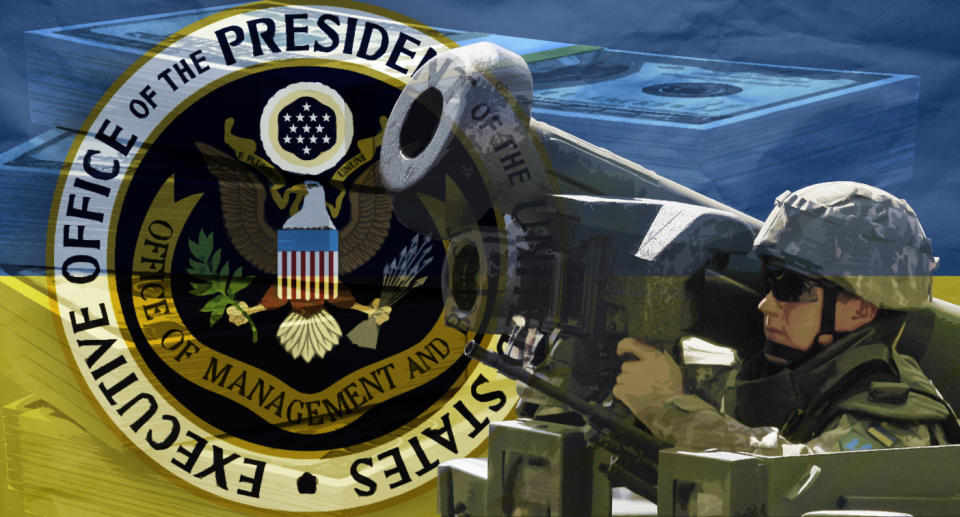
That funding hold, which ended abruptly in September, is at the heart of the impeachment inquiry begun by Democrats later that month. They charge that Trump used the $400 million in military and nonmilitary assistance as a means to pressure new Ukrainian President Volodymyr Zelensky into announcing investigations that could hurt the Democratic Party and its leading contender in the 2020 presidential election, former Vice President Joe Biden.
The new documents were obtained through a Freedom of Information Act request by American Oversight, a watchdog organization that has been a frequent adversary of the Trump administration. The release came as Democrats pressed for a Senate trial that would include both witness testimony and document production from the administration. So far, Senate Majority Leader Mitch McConnell has successfully resisted those calls.
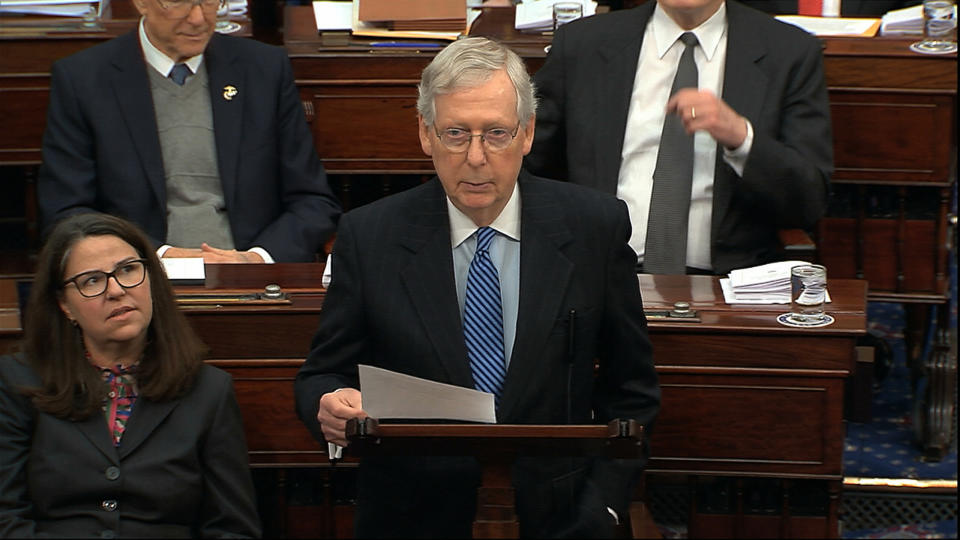
The new documents from the budget office raise far more questions than they answer. They suggest that despite months of intense scrutiny, much remains unknown about how, exactly, the Ukraine pressure campaign was conducted — and by whom. That reality could bolster Democratic arguments that, without a fuller process, senators do not have enough information to rule on Trump’s fate.
“President Trump’s lawyers stood in the Senate on Tuesday arguing that documents are totally unnecessary for the impeachment trial, but these documents give lie to that entire position,” American Oversight executive director Austin Evers said in a statement. “Despite the Trump Administration’s obstruction and the rhetoric at the trial, the public can now see even more evidence of the president’s corrupt scheme as it unfolded in real time.”
A spokeswoman for the Office of Management and Budget declined to discuss the new documents on the record.
Most of the exchanges either involve or were initiated by Michael Duffey, a former Pentagon official and, before that, Republican operative from Wisconsin who was appointed by Trump to head national security programs at the budget office. Trump appointed Russell Vought, a conservative activist, to head the budget office, after the previous director, Mick Mulvaney, became the acting White House chief of staff.
Mulvaney, Vought and Duffey have all refused to testify before the impeachment inquiry. The new documents seem to show how extensively Vought and Duffey were involved in the Ukraine matter, though the exact nature of Mulvaney’s involvement is less clear. His one extended public comment on Ukraine, during a blustery and freewheeling Oct. 17 press conference at the White House, is widely seen as having been damaging to the president’s legal position.
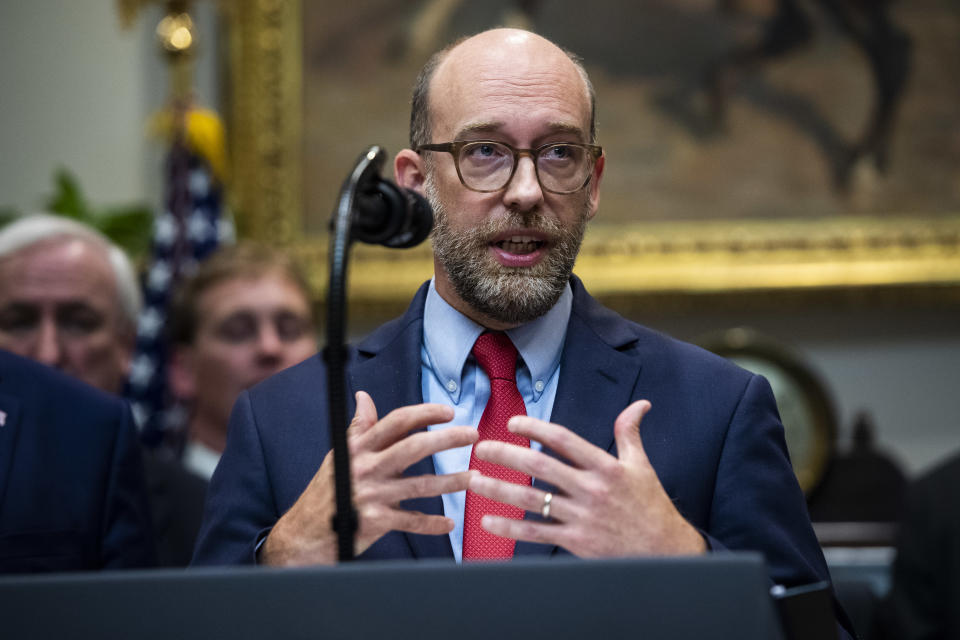
“These heavily redacted documents show just how much the Trump administration is hiding from the American people,” said Sam Berger, a vice president at the progressive Center for American Progress who was a top budget official at the Office of Management and Budget under President Barack Obama. “The Senate needs to see this evidence and talk to witnesses like Mike Duffey and Mick Mulvaney about Trump’s illegal funding hold.”
The very first email in the batch of documents is one dated June 19 that was forwarded by Duffey to Vought, bringing to his attention a news article discussing the $250 million that had been earmarked for Ukraine.
“Looking into options and will follow-up,” Duffey wrote to Vought.
This took place more than a month before the phone call between Trump and Zelensky that is at the center of the impeachment inquiry. Yet at the time, Trump’s personal lawyer Rudy Giuliani was already hard at work trying to push the Ukrainians to announce investigations into Trump’s political opponents.
In mid-July, as the date of the now-infamous phone call approached, Duffey reached out to Mark Sandy, the senior career budget officer for national security matters. Under normal circumstances, he would approve the flow of congressionally apportioned funds without much internal budget office friction.
“Can you give a ring when you break free?” Duffey wrote to Sandy on July 19.
Several months later, Sandy would testify that Duffey and other Trump political appointees failed to provide adequate grounds for not releasing the aid, and that their actions appeared to be motivated by politics, not policy.
Duffey reached out to Sandy again on July 22, in an email with the subject line “Reprogramming Approval.” The contents are redacted, but based on what Sandy has told investigators, Duffey was almost certainly interested in learning the mechanism by which aid was released — and withheld.
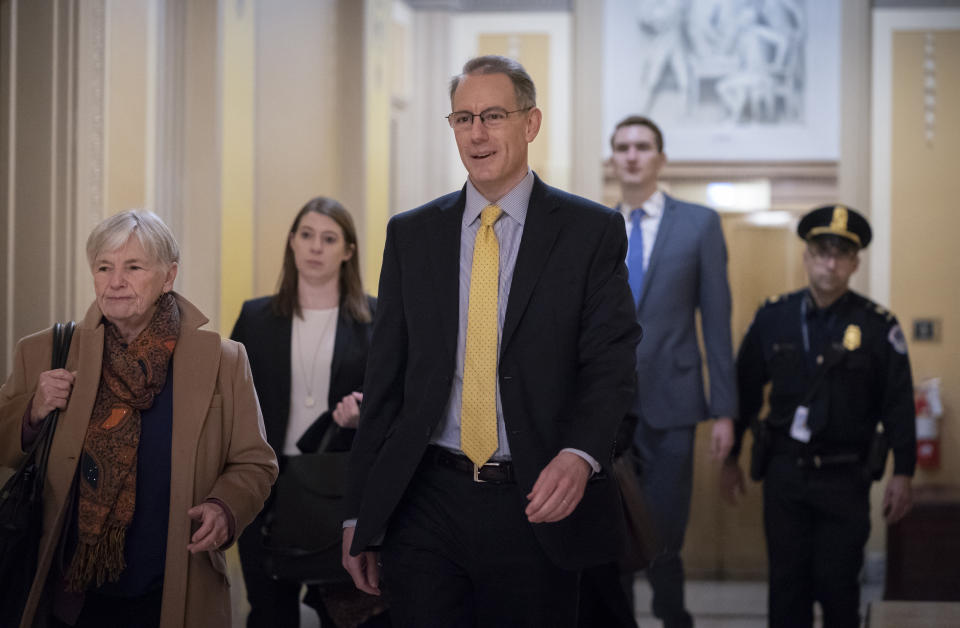
The call between Trump and Zelensky took place on July 25. In that call, Trump asked Zelensky to investigate Joe Biden’s son Hunter, who had been a board member of Burisma, a Ukrainian energy company with a history of corruption.
Documents released on Tuesday, and earlier, as well as testimony from witnesses at the impeachment inquiry, make clear that by the time the two leaders spoke, budget officials were already at work on executing the funding hold. Duffey would continue to keep the aid from moving in a series of nine “footnotes” issued throughout July, August and September.
Each footnote acted as a brake on the funds. If those funds were not released by the end of the fiscal year on Sept. 30, they would vanish altogether, and Congress would have to appropriate the military aid again.
The first “footnote” — that is, official budgetary hold — was sent by Sandy to Duffey on the morning of July 25, right around the time that Trump and Zelensky spoke. Later that day, the new emails show, Duffey met with Mark Paoletta, the general counsel in the budget office.
Duffey appears to have had significant help from Paoletta, whose name was put forward late last year as a potential “quarterback” of the Trump administration’s impeachment defense efforts.
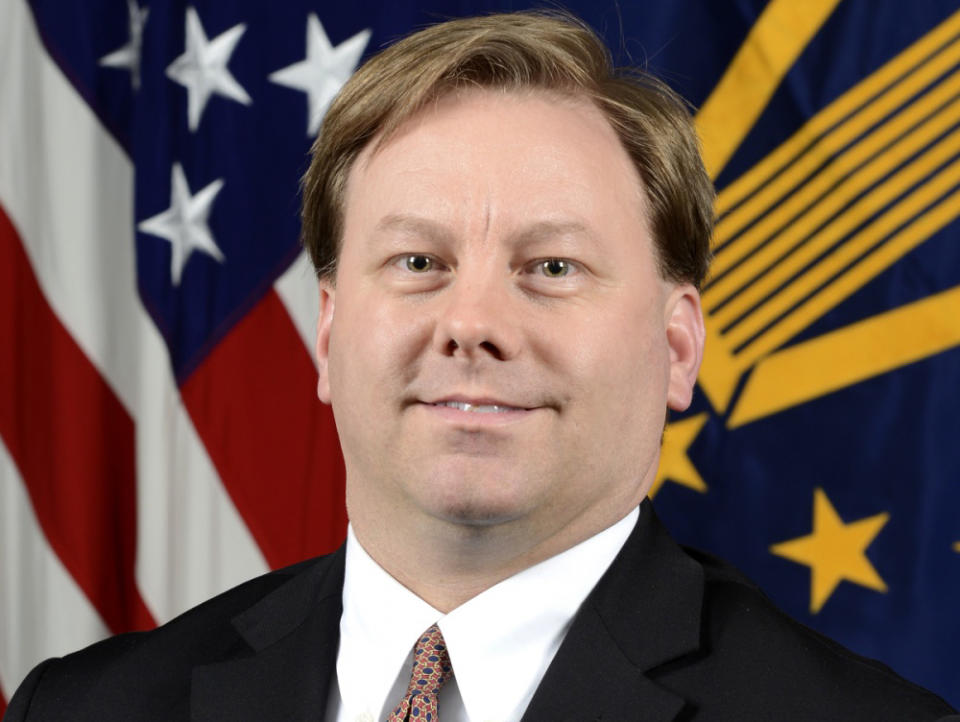
The prospect of a protracted delay clearly had Pentagon officials worried, especially since a top Defense Department official had already certified in May that Ukraine had met anti-corruption requirements. That left Elaine McCusker, the Pentagon’s comptroller, pushing throughout the summer for the money to be released, only to have her regular queries met with polite intransigence from Duffey.
“Elaine — no movement on Ukraine,” one typical email from Duffey to McCusker reads. “Footnote forthcoming to continue hold through Friday.”
At one point a top Pentagon official, Kathryn Wheelbarger, attempted to get involved, scheduling a call with Duffey for Aug. 15. For reasons that are not explained in the documents released on Tuesday, that call was canceled.
So the footnotes continued, with Duffey working closely with Paoletta, Sandy and other budget office officials.
“Is the footnote in place?” Paoletta asked on Aug. 20.
Duffey’s response came nine minutes later: “Yes.”
Just how involved or aware the White House was of the continuing holds is unclear. But at least one email lists among its recipients Amy Swonger, a top legislative aide in the White House. Swonger worked closely with Brett Kavanaugh during his contentious Supreme Court confirmation fight. She had previously worked for McConnell, the Senate majority leader, who is now orchestrating the impeachment trial of President Trump.
The hold so alarmed Pentagon officials — who were concerned that Ukraine be able to defend itself against Russia — that the Defense Department general counsel, Edwin Castle, contacted Paoletta directly to discuss McCusker’s concerns with him. The contents of Castle’s email, sent on Aug. 22, are redacted.
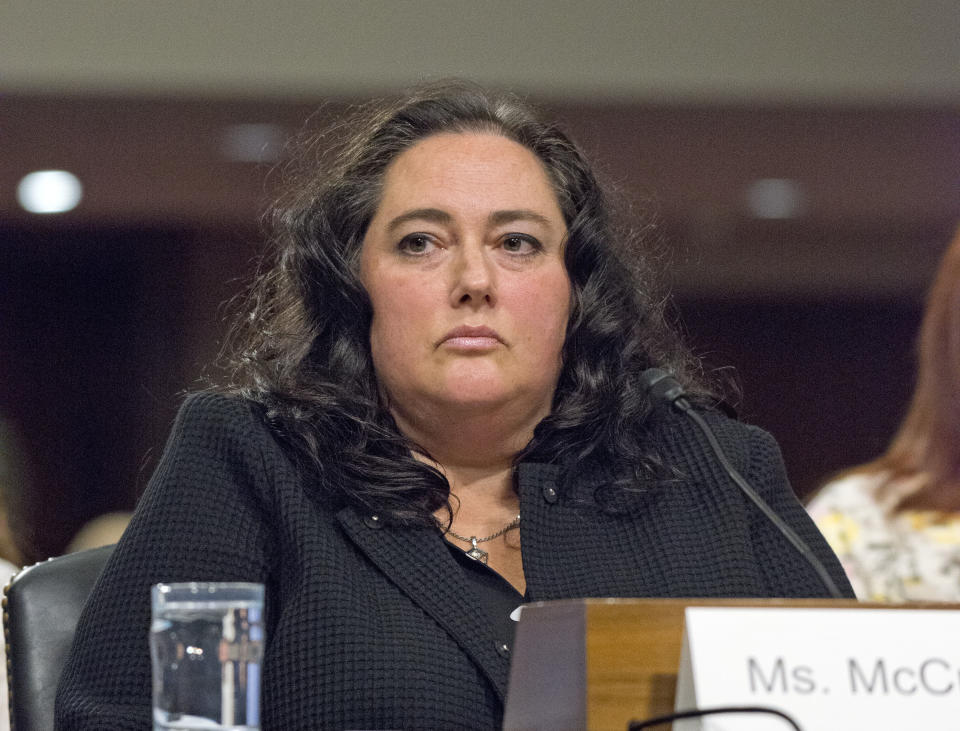
Yahoo News reported in October that the Department of Defense was prepared to rule the holds orchestrated by Vought, Duffey and Paoletta illegal. The budget office later told officials at the Pentagon that a direct presidential order had made them legal.
A report released last week by the Government Accountability Office, however, said Trump had no authority to withhold those funds. “Faithful execution of the law does not permit the President to substitute his own policy priorities for those that Congress has enacted into law,” the report said.
Democrats have said the report bolsters their case against Trump, calling it a “bombshell.” Republicans maintain that he did nothing wrong, and that the report is inconsequential.
By the time that Castle reached out to Paoletta, an intelligence community official had already filed a whistleblower complaint about Trump’s phone call with Zelensky. Congress was notified of the complaint on Sept. 9, with Michael Atkinson, inspector general of the intelligence community, describing “a serious or flagrant problem, abuse, violation of the law.”
News reports had also started to emerge by late August about the Ukraine hold. Accordingly, the 192-page trove made public on Tuesday shows that, starting in late August, journalists began to ask OMB spokeswoman Rachel Semmel about why the appropriated money had not yet been disbursed.
In early September, members of Congress also started to ask questions about the funds. Around this time, the email record begins to include James Braid, a budget office official who acts as a liaison to Congress on appropriations matters. He previously worked for the conservative Freedom Caucus in the House of Representatives.
At 3:45 a.m. on Sept. 11, Duffey wrote to McCusker to tell her of a new footnote. But that evening, he informed her he would “immediately release” all Ukraine funding. He did not explain why he was doing so.
By this time the White House was aware of the whistleblower complaint, and its potentially disastrous ramifications for the Trump presidency. Those worries were not unfounded. The House of Representatives launched an impeachment inquiry two weeks later.
_____
Read more from Yahoo News:




